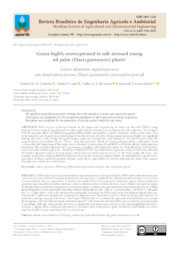Genes highly overexpressed in salt-stressed young oil palm (Elaeis guineensis) plants.
Genes highly overexpressed in salt-stressed young oil palm (Elaeis guineensis) plants.
Author(s): FERREIRA, T. M. M.; LEAO, A. P.; SOUSA, C. A. F. de; SOUZA JUNIOR, M. T.
Summary: Abstract: RNA-seq is a technique based on the large-scale sequencing of transcript-derived cDNAs using next-generation sequencing platforms mostly used today to characterize an organism?s transcriptome. The analysis of RNA-seq data allows for identifying genes differentially expressed in a given condition, such as salt stress. This study aimed to search and characterize genes from the African oil palm (Elaeis guineensis Jacq.) highly up-regulated during salt stress, with a long-term goal of gene promoter prospection and validation. The apical leaves from the control (electrical conductivity of ~2 dS m-1) and salt-stressed (~40 dS m-1) young oil palm plants, collected at 5 and 12 days after the beginning of the stress, were subjected to extraction of total RNA, with three plants (replicates) per treatment. The complete genome of E. guineensis, available at the National Center for Biotechnology Information, was used as the reference genome - BioProject PRJNA192219. The differential expression analysis led to the selection for further characterization of seven genes, which had increased expressions of 37?84 times under salt stress. The strategy used in this study enabled the selection of seven salt-responsive genes highly up-regulated during salt stress, and some of them coded for proteins already reported as responsible for salinity tolerance in other plant species through over-expression or knockout. Resumo: O RNA-seq é uma técnica baseada no sequenciamento em larga escala de cDNAs derivados de transcritos - por meio de plataformas de sequenciamento de nova geração ? amplamente utilizada atualmente para caracterizar o transcriptoma de um organismo. A análise dos dados de RNA-seq permite identificar genes diferencialmente expressos em uma determinada condição, como o estresse salino. Este estudo teve como objetivo prospectar genes do dendê (Elaeis guineensis) responsivos ao estresse salino e realizar sua caracterização funcional e estrutural. A folha apical de plantas jovens de dendê controle (condutividade elétrica de ~2 dS m-1) e estressadas (~40 dS m-1), coletadas aos 5 e 12 dias após o início do estresse, foi submetida à extração de RNA total, com três plantas (repetições) por tratamento. O genoma completo de E. guineensis, disponível no ?National Center for Biotechnology Information?, foi utilizado como genoma de referência - BioProject PRJNA192219. A análise da expressão diferencial levou à seleção de sete genes, cujo nível de expressão aumentou entre 37 e 84 vezes sob estresse salino, para posterior caracterização. A estratégia utilizada neste estudo permitiu a seleção de sete genes responsivos ao sal suprarregulados durante o estresse, e alguns deles codificam proteínas já relatadas como responsáveis pela tolerância à salinidade em outras espécies de plantas por superexpressão ou knock-out.
Publication year: 2021
Types of publication: Journal article
Unit: Embrapa Agroenergy
Observation
Some of Embrapa's publications are published as ePub files. To read them, use or download one of the following free software options to your computer or mobile device. Android: Google Play Books; IOS: iBooks; Windows and Linux: Calibre.
Access other publications
Access the Agricultural Research Database (BDPA) to consult Embrapa's full library collection and records.
Visit Embrapa Bookstore to purchase books and other publications sold by Embrapa.

